World War Two: Russian medals for last Arctic Convoys veterans
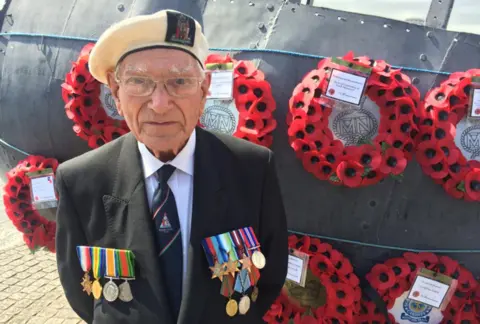 Stephen Doughty MP
Stephen Doughty MPThe last surviving veterans of the so-called Arctic Convoys will be receiving medals to mark the anniversary of the final naval escorts of World War Two.
Harold Boudier, 94, from Penarth, was on the last wartime supply voyage to Russia from a naval base in Scotland, which he joined 75 years ago today.
The contribution of the Merchant Navy and Royal Navy was forgotten during the Cold War which followed.
But the Russian Embassy has marked the role of UK veterans in recent years.
According to embassy records, there are about 550 Arctic convoy veterans in the UK who are eligible to accept the latest medal.
A total of 78 convoys took vital supplies of food and military equipment to northern Russia, after the Soviet Union joined the war in 1941.
Harold signed on for the Merchant Navy in Cardiff in 1944, aged 18. Because he was colour blind, he was unable to join the Royal Navy.
As it turned out, he saw war action when he was sent to Liverpool to join HMS Premier, an American-built aircraft carrier, which was involved in transporting aircraft and anti-submarine exercises.
Premier began operating out of Scapa Flow in the Orkney Islands, where the ship was involved in mine-laying and naval operations off the coast of Norway.
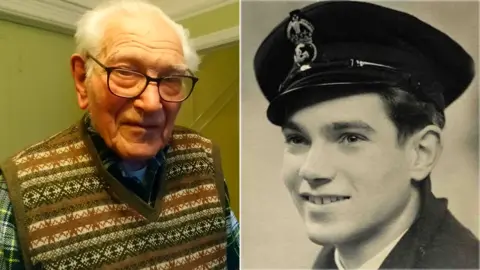
On 18 April 1945, Harold, then 19, was on board HMS Premier when she joined the escort JW 66 in what proved to be the final Arctic Convoy to the Soviet Union.
This 25-strong escort was protecting about 27 supply vessels, mostly American, heading for Murmansk, with aircraft from the carrier providing air cover.
As an engineer's writer, Harold was responsible for all the clerical work and communications for the engine room, including reports for the Admiralty.
"I could only type slowly but I was accurate," he said.
"I was in the engineer room soccer team and the ship's soccer team. When we were at Scapa Flow [in the Orkneys], someone had the bright idea of having a game of rugby, so they asked where I played, and I said outside half and when I said I was from Cardiff, it was 'you're in!'"
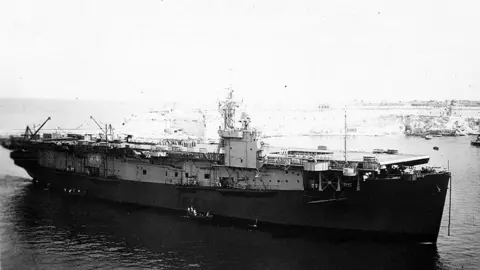 Arkivi/Getty Images
Arkivi/Getty ImagesHMS Premier managed to escape the attention of U-boats and the outward voyage passed off without incident.
It then spent five days outside the port at Murmansk.
"We went to a small fishing village," recalled Harold.
"I'm a bit of a loner, I just wanted a look around but I was suddenly confronted with a Russian soldier with a rifle, with a bayonet fitted. He didn't speak any English and I didn't speak any Russian but he turned around and walked away."
He then turned to his own personal supplies.
"I also exchanged a pair of long boot stockings for a bottle of vodka. We didn't have vodka during the war, so I took it back home for my girlfriend," he said.
"The only drink you could do on the ship was the daily 'tot'"
The ships then headed back on the return voyage, convoy RA 66.
But by now 14 U-boats were lying in wait for the convoy off the Kola Inlet and it was to be the Royal Navy's last battle with enemy submarines.
One frigate HMS Goodall was torpedoed with the loss of 97 lives, while two German submarines were sunk on 29 April. Premier carried out patrols and her aircraft saw off hostile aircraft.
Then one of the anti-submarine patrol planes - an Avenger - crashed into the stern of the ship on its return from a patrol.
"It was entangled in the stern and the engine caught fire but very fortunately the three men in the crew managed to crawl free and the aircraft was disentangled and ditched," said Harold.
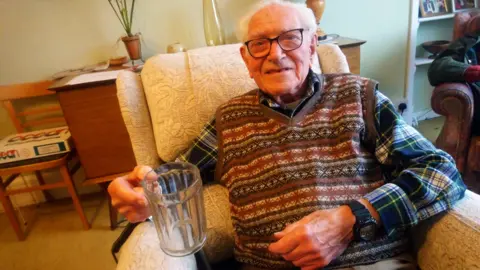
The ship returned to Scapa Flow on 7 May - in time for news that the war had ended.
"It was announced on the tannoy that the war was over and there would be leave the next day for half of the crew - and I was lucky enough to be one of those. We went to the NAAFI (catering), and had food and quite a bit to drink!
"I never made a habit of pinching glasses from pubs but I filled a tankard from the NAAFI with beer for one of my mates who wasn't allowed leave. I carried it all along the quayside, along the drifter, up the gangway, and handed the pint to my friend - and he gave me the glass back and I've still got it.
"Every VE Day, I go to the local pub with it."
After the fall of the Soviet Union in the late 1980s, Harold travelled back to Murmansk and stayed with a family, after an offer from the local mayor. His host was an English teacher who had never visited Britain, who was married to a captain in the Russian northern fleet.
He kept in touch with the family and the school.
"They were very enthusiastic and started their own museum," he added.
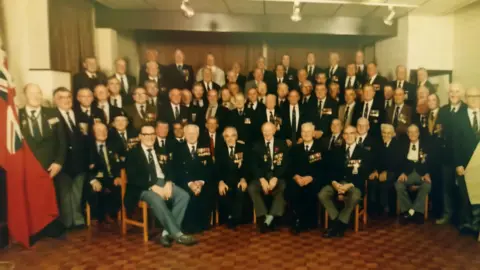 Harold Boudier
Harold BoudierHarold also joined the once-thriving South Wales Russian Convoy Club, made up of 200 veterans, but he only knows of two others still alive.
After the war, Harold studied chemistry, physics and maths at Cardiff University, before initially deciding to re-join the Merchant Navy as an assistant purser.
For a short time he was aboard the Rhodesia Star - which turned out to be the new name for his old ship, the Premier, converted into a cargo vessel.
 Russian Embassy
Russian EmbassyAlan Higgins, 96, joined the Royal Navy as a teenager in Barry Dock.
"I swept the decks and made tea as a boy and when I was 18 I became a telegraphist and we dealt with a lot of messages in code."
He took part in his first Russian convoy on HMS Edinburgh in December 1941 - Christmas lunch was half a tin of steak and kidney pie with rice. Altogether he made eight supply voyages.
But on 30 April 1942, two days after leaving Murmansk, his ship was hit by torpedoes. He described in his memoirs the experience as feeling like it had been "clasped in a trembling hand".
Alan, who now lives in Bridgend, recalled a "terrific explosion" and wrote of hearing "cries from the injured and dying in the next compartment, a scant eighth of an inch steel bulkhead away".
"It was just after four o'clock in the afternoon and we were just having tea. There was a bloody big bang and a flash," he told BBC Wales.
The crippled ship came under further attack from warships and another submarine before being abandoned. Around 840 men were saved but 58 died.
"At the same time, thousands of miles away back in Barry, my mother turned to my father and said 'Alan's in trouble.'"
He indeed thought his time was up - and speculated how quickly he might die in the icy water - before he was rescued.
"I was never scared though, you took it for granted."
Meanwhile, there was another rescue effort which would have to wait 40 years.
The Edinburgh had been carrying 4,570 kg of Russian gold ingots, a payment for armaments. The haul - worth many millions - was lost until it was finally recovered in the 1980s.
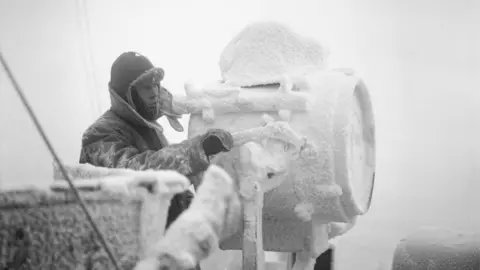 IWM/Getty Images
IWM/Getty ImagesHarold and Alan, along with other surviving members of the Arctic Convoys have since received honours from the Russian government - and were presented with an Arctic Star medal for the 70th anniversary in Cardiff.
They are two of those remaining veterans who will receive a 75th anniversary medal - which will be sent by post because of the current coronavirus lockdown.
But Harold thinks it's important the convoys are not forgotten.
"They were a very important part of the war - they were forgotten because the British government always had a negative view of it," said Harold, a retired industrial chemist who raised five children, with his late wife Rhona in Penarth.
"We knew them as the Russian convoys, not the Arctic convoys."
Alan added: "It's such a long time ago, so it must seem like the Battle of Waterloo [to some], but I've done talks at schools and the kids are really interested."
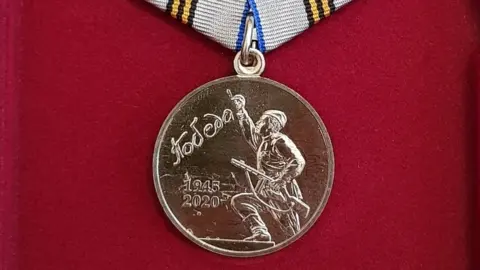 Russian Embassy
Russian EmbassyAlvetina Kempster, who normally organises commemoration events in Cardiff, said: "I'm 48 and when we were at school in the Soviet Union we were taught nothing about the Russian convoys at all, it was all about the Great Patriotic War.
"But since meeting the likes of Mr Higgins and Mr Boudier, I've realised the extraordinary help they provided at the time.
"It's very, very important we remember," she added.
A spokesman for the Russian embassy said: "It is important to show that we remember them, their courage and their role in our common victory. We are grateful to them and we will preserve this memory.
"For this reason we have decided that presenting the veterans with this medal would be a great way to celebrate the anniversary and congratulate them on Victory Day."
